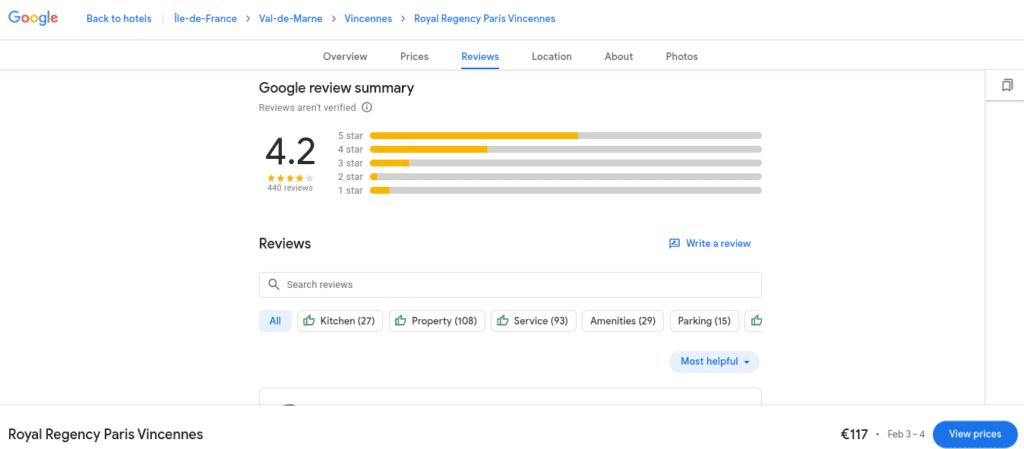Google made changes to Google Flights and Hotels related to transparency in hotel reviews and pricing under pressure from the European Commission — but stopped short of making those modifications elsewhere in the world.

At the behest of the European Commission, Google added text in hotel reviews in European Union countries, noting “Reviews aren’t verified.”
Unlike online travel agencies, Google doesn’t take bookings so it would be hard-pressed to verify user reviews. Tripadvisor, likewise, doesn’t verify hotel reviews for the same reason.
Clicking further into Google’s explanatory language about user reviews in Europe, Google states that it accepts reviews from signed-in users — there’s no requirement that they ever stayed at that particular hotel — and licenses reviews from third-parties. “Google doesn’t do any additional filtering for spam or inappropriate language beyond that done by the provider, nor do we verify these reviews,” Google states.
The European Commission stated that Google accepted this disclosure about hotel reviews and additional transparency commitments that other hotel-booking platforms such as Expedia Group and Booking.com agreed to on pricing and availability.
“The commitments made by Google are a step forward in this direction. We call on Google to comply fully with the Geo-blocking Regulation, ensuring that consumers can enjoy the same rights and access the same content, wherever they are in the EU,” European Commission Commissioner for Justice Didier Reynders in the announcement statement.
Google agreed to these changes about user reviews, consented to disclose that Google Flights and Google Hotels is merely a middleman, and agreed to provide greater clarity when presenting discounted pricing, explaining that such deals are merely a reference point. But Google decided to make these changes in Europe only — and not in other geographies around the world where regulators were not providing heat.
“As part of our ongoing dialogue with the European Commission and the EU’s Consumer Protection Cooperation Network, we have made changes to our products that provide a clear benefit and protect consumers,” a Google spokesperson stated. “We appreciate the partnership on this topic and are open to constructive dialogue with all consumer associations and regulators.”
Google’s hotel reviews in the U.S. and elsewhere in the world have no added language explaining the reviews are not verified. So travelers might erroneously believe that everyone writing reviews about these hotels actually stayed a night or two there.

Google frequently talks about helping travelers and other consumers to discover information as being one of its top priorities. However, the search engine giant, perhaps in the interests of providing a cleaner user interface that wouldn’t get in the way of users clicking on hotel ads, sacrificed transparency for expediency in the rest of the world.
Google is not alone in doing what regulators demand in one geography, but not expanding it to other regions for the good of consumers. For example, for several years Airbnb has shown the total price of stays, including taxes, up-front in the European Union at the urging of the European Commission. However, it was only this year that Airbnb became displaying the total rate, albeit without taxes included, instead of just the nightly rate without fees at first glance, in other geographies.
